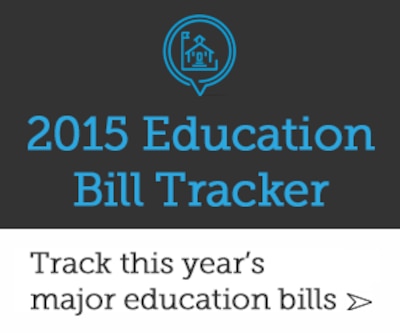While the focus so far this week at the Capitol has been on the budget and on testing, other education bills of interest are on the move. Here are the details.
Chartering authority bill heads to House
The Senate Tuesday gave 21-14 final approval to Senate Bill 15-216, which would affect the exclusive chartering authority of districts that are on the state’s accountability watch list for more than three years.
The bill would require that such districts lose that authority if they are in year three of priority improvement or turnaround and do not have an agreement with the State Charter School Institute governing placement of institute charters in the district.
The goal of the bill, according to prime sponsor Sen. Owen Hill, R-Colorado Springs, is to give students in struggling districts more choices of high-quality schools. Under current law, the state can intervene in districts that have had low ratings for five consecutive years. Hill argues that students should have more choices after three years. (Get more information in this legislative staff summary.)
School finance study passed by House Education
A bipartisan bill that would create a legislative school finance oversight committee passed the House Education Committee in a 9-2 vote Monday.

House Bill 15-1334 would set up a 10-member panel to study Colorado’s K-12 funding system and recommend changes to both state law and the constitution.
The group would be advised by a nine-member technical advisory committee of district administrators and school finance experts.
The two groups would work together this year and next and would make specific recommendations on both statutory and constitutional changes to the 2016 and 2017 legislative sessions.
“It’s not a question in anybody’s mind that we have to do this. The question is doing it right,” said prime sponsor Rep. Bob Rankin, R-Carbondale.
The other prime sponsor, Democratic Rep. Millie Hamner of Dillon, said the current 20-year-old system is outdated, and “the original intent of equity has been skewed. … Our primary responsibility should be ensuring every child has equal access and opportunity.”
During the last decade there have been two state studies and one outside review of the school finance system. The outside study helped lead to approval of a comprehensive school-funding rewrite by the 2013 legislature. But that plan never went into effect because voters rejected the $1 billion tax increase needed to pay for the new system.
The bill has a $520,000 price tag over two years. Its next stop is the House Appropriations Committee.
Student learning objectives bill gets first committee approval
The House Education Committee on Monday also voted 6-5 in favor of House Bill 15-1324, a measure intended to encourage schools to use “student learning objectives.”
Student learning objectives are customized learning goals for classrooms and individual students that are used to track academic progress.
The bill is strongly backed by the Colorado Education Association, which wants to expand use of such learning objectives in teacher evaluations.
Specifically, the bill would create a $1 million grant program for districts that want to work on developing such programs. Some Colorado districts already are experimenting with the concept. The bill will be considered next by House Appropriations.
School discipline bill moves to Senate floor
The Senate State Affairs Committee on Tuesday approved House Bill 15-1240, which would encourage school districts to reach formal agreements with local law enforcement on how to handle student-police contacts. The goal is reduce the number of school problems that get referred to police.
The measure is an effort by sponsors Sen. David Balmer, R-Centennial, and Rep. Rhonda Fields, D-Aurora, to divert more disciplinary matters to school administrators and thereby keep more students in school.
Balmer told the committee that one arrest doubles a student’s odds of dropping out of school and that “the impact of being ticketed or arrested can follow a student for the rest of their lives.”
The vote was 3-2.

